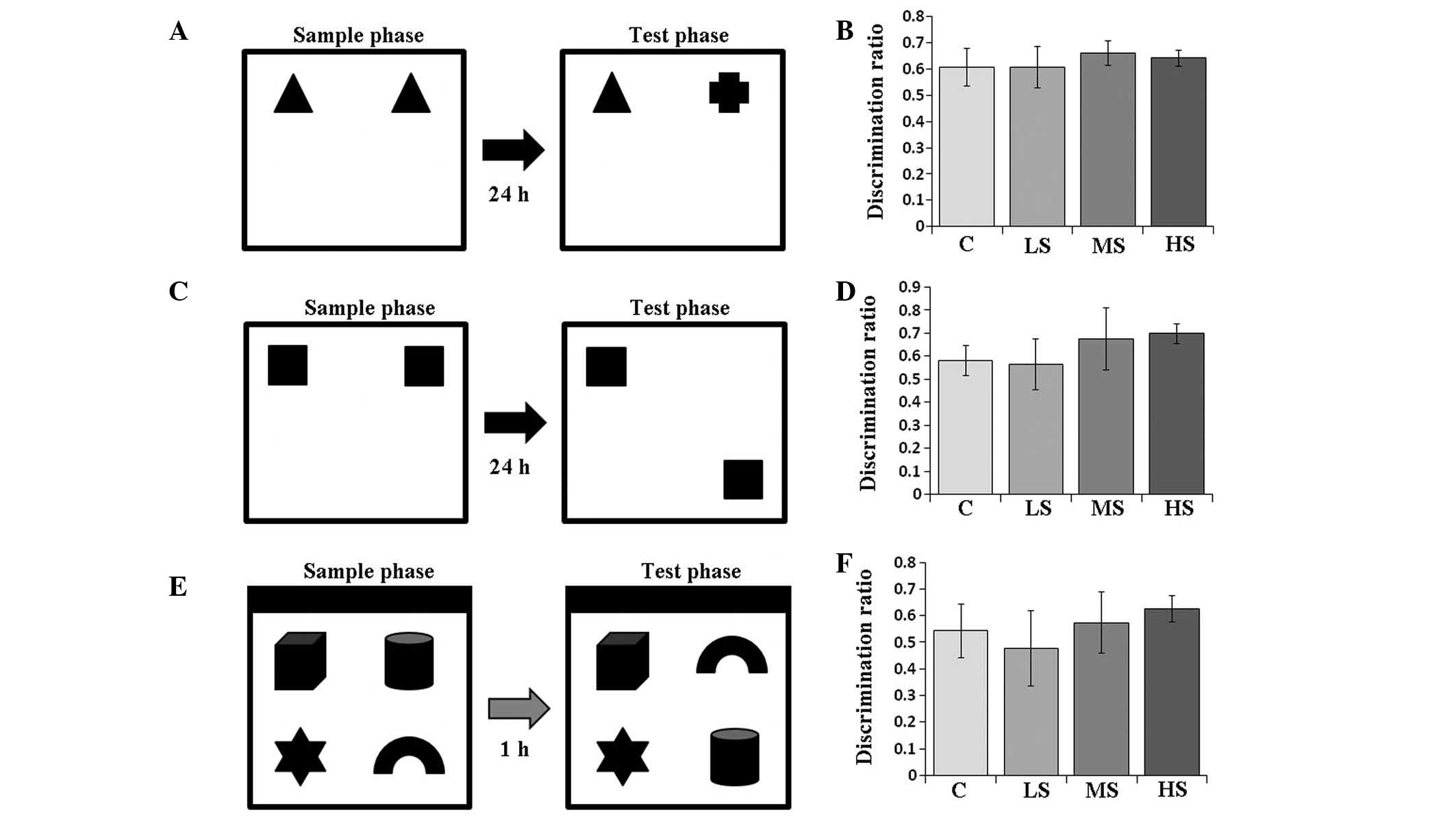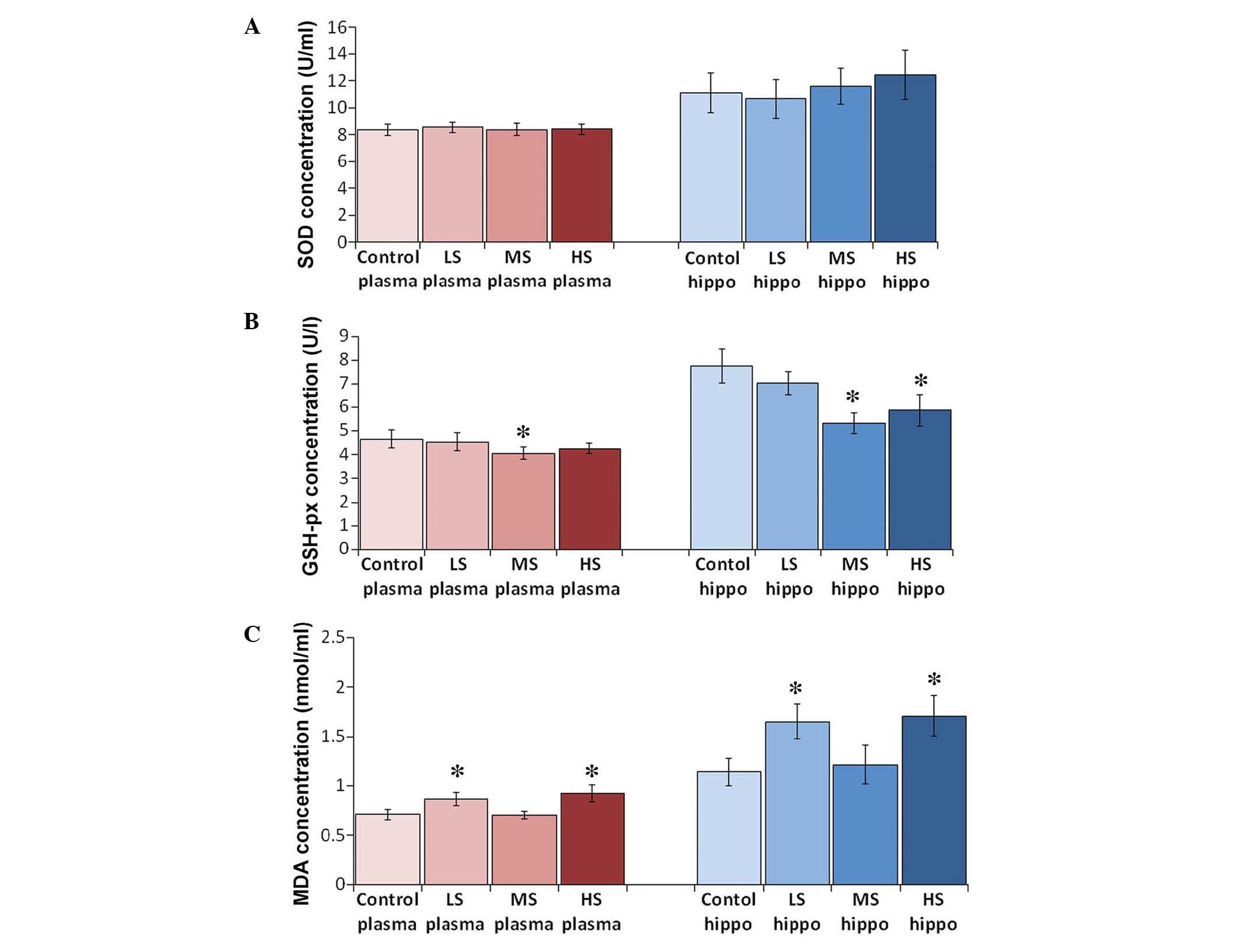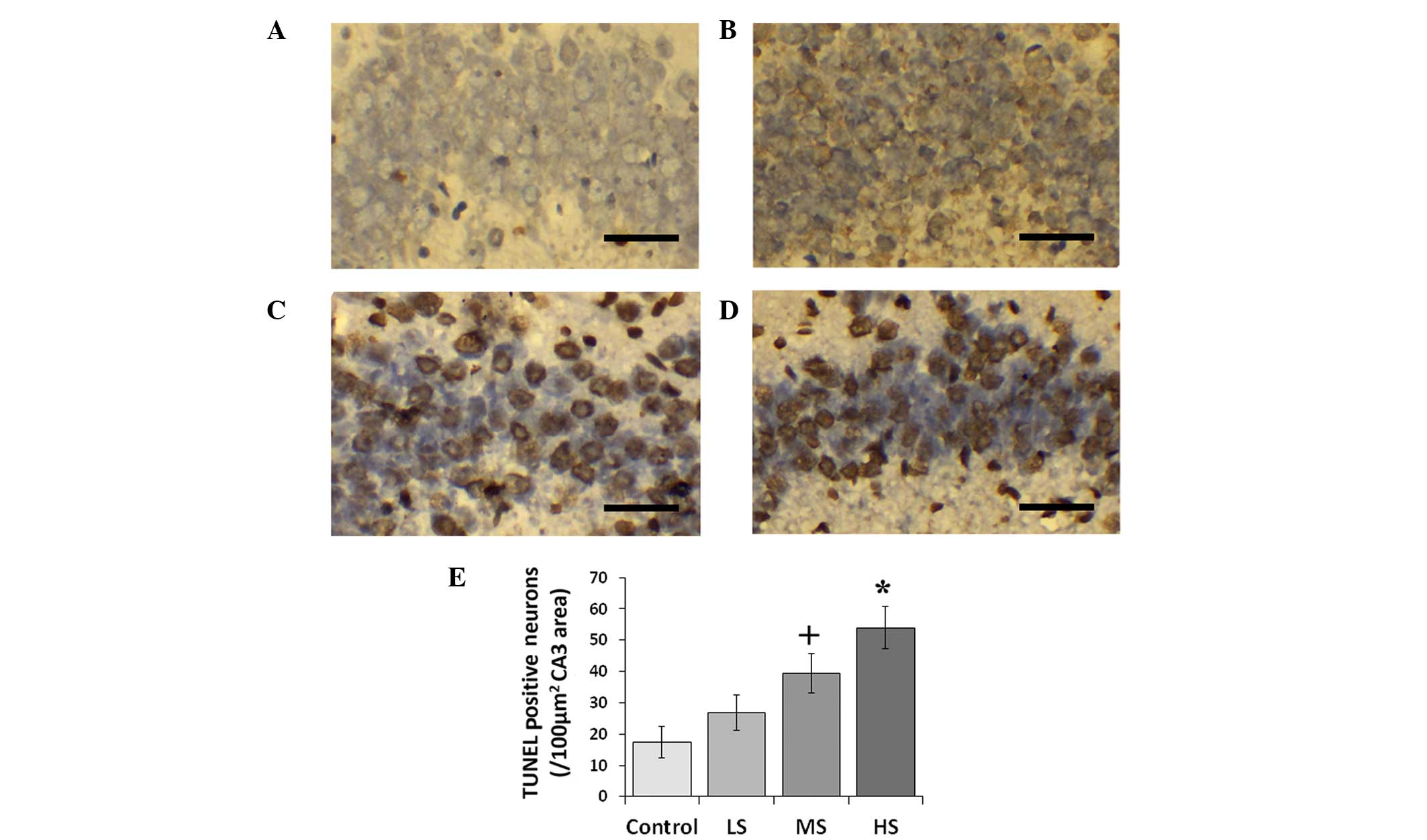|
1
|
Mellon RD, Simone AF and Rappaport BA: Use
of anesthetic agents in neonates and young children. Anesth Analg.
104:509–520. 2007. View Article : Google Scholar : PubMed/NCBI
|
|
2
|
Sarner JB, Levine M, Davis PJ, Lerman J,
Cook DR and Motoyama EK: Clinical characteristics of sevoflurane in
children. A comparison with halothane. Anesthesiology. 82:38–46.
1995. View Article : Google Scholar : PubMed/NCBI
|
|
3
|
Payne RS, Akca O, Roewer N, Schurr A and
Kehl F: Sevoflurane-induced preconditioning protects against
cerebral ischemic neuronal damage in rats. Brain Res. 1034:147–152.
2005. View Article : Google Scholar : PubMed/NCBI
|
|
4
|
Zuo Z: A novel mechanism for sevoflurane
preconditioning-induced neuroprotection. Anesthesiology.
117:942–944. 2012. View Article : Google Scholar : PubMed/NCBI
|
|
5
|
Zhang X, Xue Z and Sun A: Subclinical
concentration of sevoflurane potentiates neuronal apoptosis in the
developing C57BL/6 mouse brain. Neuroscience letters. 447:109–114.
2008. View Article : Google Scholar : PubMed/NCBI
|
|
6
|
Satomoto M, Satoh Y, Terui K, Miyao H,
Takishima K, Ito M and Imaki J: Neonatal exposure to sevoflurane
induces abnormal social behaviors and deficits in fear conditioning
in mice. Anesthesiology. 110:628–637. 2009. View Article : Google Scholar : PubMed/NCBI
|
|
7
|
Komatsu H, Ohara T, Nogaya J, Yokono S and
Ogli K: Subanesthetic concentrations of volatile anesthetics may
enhance acquired avoidance training in ddN mice. Anesth Analg.
73:295–299. 1991. View Article : Google Scholar : PubMed/NCBI
|
|
8
|
Komatsu H, Nogaya J, Kuratani N, Ueki M,
Yokono S and Ogli K: Psychomotor performance during initial stage
of exposure to halothane, enflurane, isoflurane and sevoflurane in
mice. Clin Exp Pharmacol Physiol. 24:706–709. 1997. View Article : Google Scholar : PubMed/NCBI
|
|
9
|
Otsubo T, Maekawa M, Nagai T, Sakio H and
Hori Y: Facilitatory effects of subanesthetic sevoflurane on
excitatory synaptic transmission and synaptic plasticity in the
mouse hippocampal CA1 area. Brain Res. 1197:32–39. 2008. View Article : Google Scholar : PubMed/NCBI
|
|
10
|
Buttke TM and Sandstrom PA: Oxidative
stress as a mediator of apoptosis. Immunol Today. 15:7–10. 1994.
View Article : Google Scholar : PubMed/NCBI
|
|
11
|
Orliaguet G, Vivien B, Langeron O,
Bouhemad B, Coriat P and Riou B: Minimum alveolar concentration of
volatile anesthetics in rats during postnatal maturation.
Anesthesiology. 95:734–739. 2001. View Article : Google Scholar : PubMed/NCBI
|
|
12
|
Alkire MT, Nathan SV and McReynolds JR:
Memory enhancing effect of low-dose sevoflurane does not occur in
basolateral amygdala-lesioned rats. Anesthesiology. 103:1167–1173.
2005. View Article : Google Scholar : PubMed/NCBI
|
|
13
|
Alkire MT and Gorski LA: Relative amnesic
potency of five inhalational anesthetics follows the Meyer-Overton
rule. Anesthesiology. 101:417–429. 2004. View Article : Google Scholar : PubMed/NCBI
|
|
14
|
Feng X, Liu JJ, Zhou X, Song FH, Yang XY,
Chen XS, Huang WQ, Zhou LH and Ye JH: Single sevoflurane exposure
decreases neuronal nitric oxide synthase levels in the hippocampus
of developing rats. Br J Anaesth. 109:225–233. 2012. View Article : Google Scholar : PubMed/NCBI
|
|
15
|
Zhou X, Song FH, He W, Yang XY, Zhou ZB,
Feng X and Zhou LH: Neonatal exposure to sevoflurane causes
apoptosis and reduces nNOS protein expression in rat hippocampus.
Mol Med Rep. 6:543–546. 2012.PubMed/NCBI
|
|
16
|
Young C, Jevtovic-Todorovic V, Qin YQ,
Tenkova T, Wang H, Labruyere J and Olney JW: Potential of ketamine
and midazolam, individually or in combination, to induce apoptotic
neurodegeneration in the infant mouse brain. Br J Pharmacol.
146:189–197. 2005. View Article : Google Scholar : PubMed/NCBI
|
|
17
|
Lu LX, Yon JH, Carter LB and
Jevtovic-Todorovic V: General anesthesia activates BDNF-dependent
neuroapoptosis in the developing rat brain. Apoptosis.
11:1603–1615. 2006. View Article : Google Scholar : PubMed/NCBI
|
|
18
|
Wang J, Yan L, Zhao X, Wu W and Zhou LH:
The diversity of nNOS gene expression in avulsion-injured spinal
motoneurons among laboratory rodents. Nitric Oxide. 22:37–42. 2010.
View Article : Google Scholar
|
|
19
|
Ananth C, Dheen ST, Gopalakrishnakone P
and Kaur C: Distribution of NADPH-diaphorase and expression of
nNOS, N-methyl-D-aspartate receptor (NMDAR1) and non-NMDA glutamate
receptor (GlutR2) genes in the neurons of the hippocampus after
domoic acid-induced lesions in adult rats. Hippocampus. 13:260–272.
2003. View Article : Google Scholar : PubMed/NCBI
|
|
20
|
Howland JG, Cazakoff BN and Zhang Y:
Altered object-in-place recognition memory, prepulse inhibition and
locomotor activity in the offspring of rats exposed to a viral
mimetic during pregnancy. Neuroscience. 201:184–198. 2012.
View Article : Google Scholar
|
|
21
|
Howland JG and Cazakoff BN: Effects of
acute stress and GluN2B-containing NMDA receptor antagonism on
object and object-place recognition memory. Neurobiol Learn Mem.
93:261–267. 2010. View Article : Google Scholar
|
|
22
|
Dix SL and Aggleton JP: Extending the
spontaneous preference test of recognition: Evidence of
object-location and object-context recognition. Behav Brain Res.
99:191–200. 1999. View Article : Google Scholar : PubMed/NCBI
|
|
23
|
Clark RE, Zola SM and Squire LR: Impaired
recognition memory in rats after damage to the hippocampus. J
Neurosci. 20:8853–8860. 2000.PubMed/NCBI
|
|
24
|
Barker GR and Warburton EC: NMDA receptor
plasticity in the perirhinal and prefrontal cortices is crucial for
the acquisition of long-term object-in-place associative memory. J
Neurosci. 28:2837–2844. 2008. View Article : Google Scholar : PubMed/NCBI
|
|
25
|
Drabko K, Bojarska-Junak A and Kowalczyk
J: Activity of superoxide dismutase and glutathione peroxidase and
concentrations of malonyldialdehyde, vitamin E, total antioxidant
status and extracellular cytokines concentrations in children with
acute lymphoblastic leukaemia (ALL). Med Wieku Rozwoj. 10:861–868.
2006.In Polish.
|
|
26
|
Aguilar A, Alvarez-Vijande R, Capdevila S,
Alcoberro J and Alcaraz A: Antioxidant patterns (superoxide
dismutase, glutathione reductase, and glutathione peroxidase) in
kidneys from non-heart-beating-donors: Experimental study.
Transplant Proc. 39:249–252. 2007. View Article : Google Scholar : PubMed/NCBI
|
|
27
|
Surapaneni KM and Venkataramana G: Status
of lipid peroxidation, glutathione, ascorbic acid, vitamin E and
antioxidant enzymes in patients with osteoarthritis. Indian J Med
Sci. 61:9–14. 2007. View Article : Google Scholar : PubMed/NCBI
|
|
28
|
Djordjevic VB: Free radicals in cell
biology. Int Rev Cytol. 237:57–89. 2004. View Article : Google Scholar : PubMed/NCBI
|
|
29
|
Gavrieli Y, Sherman Y and Ben-Sasson SA:
Identification of programmed cell death in situ via specific
labeling of nuclear DNA fragmentation. J Cell Biol. 119:493–501.
1992. View Article : Google Scholar : PubMed/NCBI
|
|
30
|
Turkan H, Aydin A, Sayal A and Karahalil
B: The effect of sevoflurane and desflurane on markers of oxidative
status in erythrocyte. Toxicol Ind Health. 27:181–186. 2011.
View Article : Google Scholar
|
|
31
|
Tsuchiya M, Asada A, Kasahara E, Sato EF,
Shindo M and Inoue M: Antioxidant protection of propofol and its
recycling in erythrocyte membranes. Am J Respir Crit Care Med.
165:54–60. 2002. View Article : Google Scholar : PubMed/NCBI
|
|
32
|
Allaouchiche B, Debon R, Goudable J,
Chassard D and Duflo F: Oxidative stress status during exposure to
propofol, sevoflurane and desflurane. Anesth Analg. 93:981–985.
2001. View Article : Google Scholar : PubMed/NCBI
|
|
33
|
Turkan H, Aydin A, Sayal A, Eken A, Akay C
and Karahalil B: Oxidative and antioxidative effects of desflurane
and sevoflurane on rat tissue in vivo. Arh Hig Rada Toksikol.
62:113–119. 2011. View Article : Google Scholar : PubMed/NCBI
|
|
34
|
Wang HL, Yang L, Guo XY, Zhang LP, Bi SS
and Lu W: Response surface analysis of sevoflurane-remifentanil
interactions on consciousness during anesthesia. Chinese Med J
(Engl). 125:2682–2687. 2012.
|
|
35
|
Broadbent NJ, Gaskin S, Squire LR and
Clark RE: Object recognition memory and the rodent hippocampus.
Learn Mem. 17:5–11. 2009. View Article : Google Scholar : PubMed/NCBI
|
|
36
|
Barker GR and Warburton EC: When is the
hippocampus involved in recognition memory? J Neurosci.
31:10721–10731. 2011. View Article : Google Scholar : PubMed/NCBI
|

















